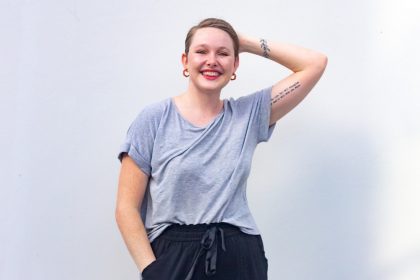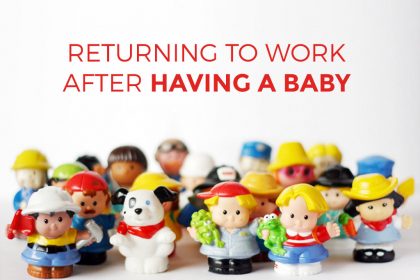How one mum has turned her career setbacks into new beginnings
Are you reeling from a career setback? Read how one mother has turned her own challenges into exciting new beginnings – and the lessons she’s learned along the way.
One of our favourite parts of running Talented Ladies Club is hearing so many amazing, inspiring stories and meeting genuinely talented, passionate women.
It’s also an honour to be part of their stories as they overcome challenges and find a way to pursue a career or business they love on their terms.
So we’re especially delighted to share the personal story of Amy, a student from our online Back to work you love course. Amy tells us how she’s overcome setbacks in her life – and managed to turn them into exciting new beginnings.
Hit a setback? Consider it a new beginning
I have always been driven and competitive, which apparently manifested itself when I was four years old and insisted on competing against older children in an egg-and-spoon race. Let me just say that other, better thought-through, challenges resulted in more success than that race.
I didn’t always come out on top but I did pretty well most of the time so it was a bit of a shock when I didn’t get a place at a university to do an English Language course I applied for.
I filled my forced gap year with various projects while trying to figure out what to do next. One of the things I did was translating a book from English into Polish, about a hundred pages which I had to type out on an old fashioned typewriter. The tediousness of it and a realisation that I wouldn’t enjoy making a living by translating other people’s thoughts put me off the idea of studying English altogether.
I decided to do Economics instead and got a place on a highly sought-after course the following year. I didn’t have any particular career in mind but the course curriculum was very broad and interesting so I knew at least I wouldn’t be bored.
Note to self 1: A setback can prevent one from making a wrong decision and allow for a move in a better direction!
Life without a challenge would be just a bit… dull
I’ve always wanted to do something interesting and meaningful so when my first job after university turned out to be boring, I started feeling restless.
It was at that time that I came across an opportunity to apply for a post-graduate scholarship at one of the universities in the UK. I thought a year abroad would provide me with valuable experience, so I decided to apply for a full-time MBA course.
I was extremely lucky I managed to submit my application before the deadline – I found out about the scheme with just over a week to spare, I needed references from my first university and the term had just ended…
The selection process took a few months and the wait was nerve-racking but following the final interview I was offered a place.
The MBA was tough. My only previous experiences of living abroad were half a year in Sweden, as an economics student trainee, and a few weeks of a summer course at the University of Oslo in Norway.
English is widely spoken in Scandinavia so I had no worries about going to study in England but as I discovered, there was a world of difference between communicating with native English speakers and those who spoke English as a second language.
Having had arrived on campus, for the first few days I could barely understand anyone! Another challenge was a volume of reading required from one day to another – I had to teach myself speed-reading (a book by Tony Buzan came in very handy) to be able to keep up with the pace of the course.
I had never considered working abroad before but towards the end of my MBA I got head-hunted by a couple of management consultancies. Consulting sounded interesting, ‘a bit of everything’ type of a job, so I thought, ‘why not?’
None of what had happened up to that point was planned, I simply went with a flow and it led me to spending the next twenty years working on all sorts of projects and travelling frequently around the world.
Every project was different; I got to work with technical people on shop floors, accountants and top management. I learnt to appreciate different cultures and to be patient when I asked someone to explain something to me and they gave me their life stories. Learning to listen is crucial in gaining people’s trust – I discovered that if I let people talk, I would often find out a fair bit of ‘off the record’ information.
Note to self 2: Going with a flow can lead to great experiences.
Clients thought I was there to make tea
One of the biggest challenges of working on international projects stemmed from cultural norms – it was about not being taken seriously on some clients’ sites, especially in countries where women were not considered equal.
Some clients would assume I was a ‘team secretary and tea-maker’ just because I was a woman and younger than my colleagues. Our roles were well explained but it was hard for some clients to accept that a woman may play an important role in a project.
I had to develop a bit of a thick skin and stand up for myself. I learnt that the key to gaining respect was being professional and competent at all times and it all worked out in the end.
The bulk of my work was feasibility studies, due diligence, business cases and investment appraisals; I built bespoke financial models, validated them against the clients’ actual data and accounts and developed cash flow projections.
Nowadays, I get to work with data in an electronic format which makes life much easier but in the early years of my career, very few overseas companies we worked with had computerised data systems. Most of the analysis involved pouring over piles of documents in various languages, making it very difficult to cross-reference facts and data.
This is when I learnt that aiming for a 100% accuracy when validating a financial model against real-life data was not the most sensible approach. I still try to get as close as I can, though…
Work and family life – it CAN be done
I really enjoyed work – we had a great team and every project was a new challenge – so I was happy to discover that my employer had decent maternity leave and flexible working policies in place and I was able to return to work part-time after my first maternity leave. I went down to three full days a week, Monday to Wednesday, but although my manager and colleagues were supportive, this arrangement didn’t feel right for me.
It was a bit odd saying ‘have a good weekend’ on Wednesday and often quite a lot would happen during the rest of the week. After my second maternity leave, I requested a change to spread three full days over four shorter days instead.
Financially, it didn’t make much sense as I had to pay four days a week of nursery fees out of the same salary as before, but I felt much happier at work with being there most of the week and being able to do the school run as well.
Note to self 3: Ask for what you want; if it doesn’t work, ask to change it.
You need to judge what’s important – and what isn’t
Working part time meant I had to share some of my workload with my colleagues so I would challenge anyone who says it cannot be done successfully.
I got into training junior staff while they worked alongside me on projects and that’s when it started sinking in how much experience I gained over the years.
It wasn’t just about the way things were done (I learnt a thing or two from my younger colleagues, too); it was also about what questions to ask, where to look for answers and about the ability to judge what was important in a context of a project and what didn’t matter much.
It struck me that many things that were obvious to me were not always so obvious to junior consultants. I suppose, sometimes we don’t realise how much we know until someone else points it out to us.
Note to self 4: We are often capable of much more than we give ourselves credit for.
Three things I learned from working part time
The most important things I learnt from working part-time are these:
- It is possible to have a successful part-time career but it requires some adjustments by both an employer and employee.
- When approaching an employer with a request for flexible working, it helps to outline to them why and how it would work, so that they can see benefits of the new arrangement to the business.
- It is important to learn to say ‘No’ to excessive demands on your time, both at work and at home. There is no point in taking on more than you can deliver.
I was made redundant after 20 years
I would most likely still enjoy the same job if not the fact that the company decided to withdraw from the market sector my team worked in and as a result we were all made redundant – difficult market conditions, restructuring and all that.
Losing a job after 20 years was not easy to come to terms with. It wasn’t just work; it was the great team spirit, the sense of camaraderie that I missed.
That’s when I had to remind myself that a setback may often be a blessing in disguise. It was by chance that I came across the ‘Talented Ladies Club’ and their Back To Work You Love course. I signed up (‘Talented Ladies’ sounded exactly like my sort of thing) and found the four weeks of exercises with worksheets and videos, plus support from with Hannah Martin and Fiona Clark, very helpful.
The course has made me realise how many different skills I have and that I take many of them for granted simply because they have become my second nature. It is so easy to forget that certain things can only come with experience. Thank you, Hannah and Fiona!










